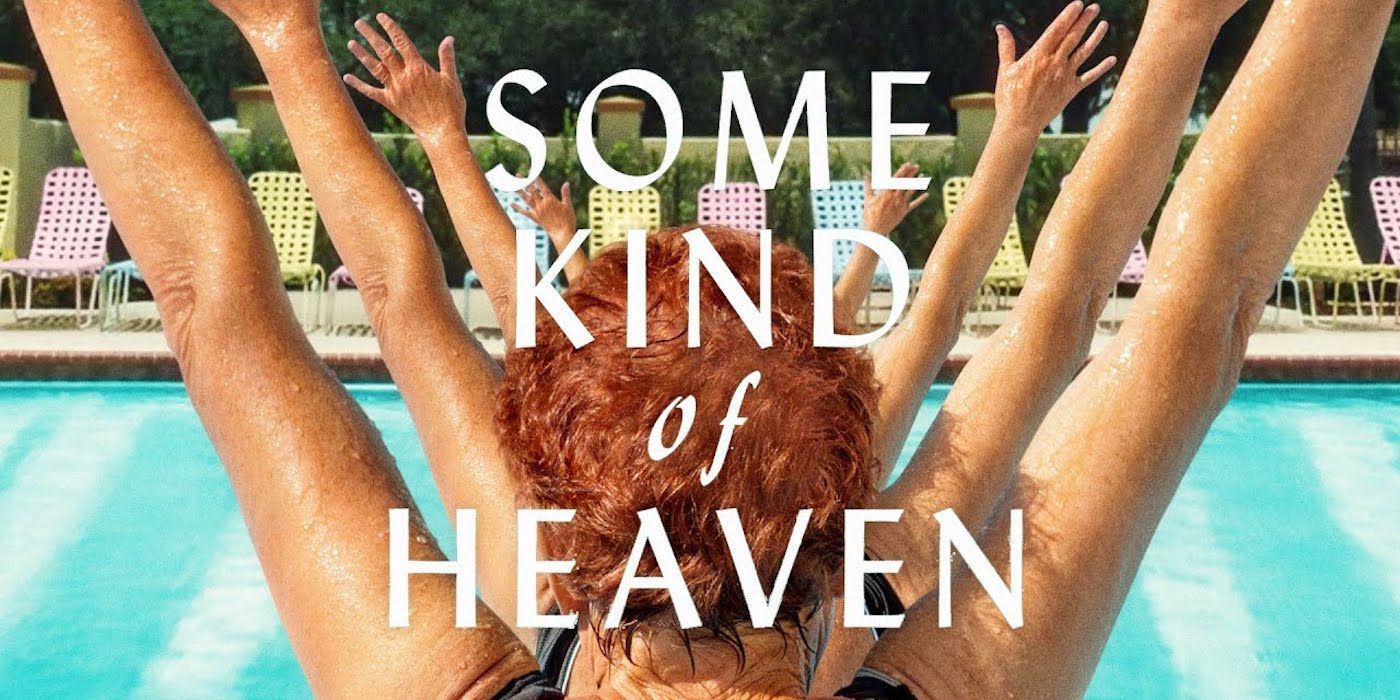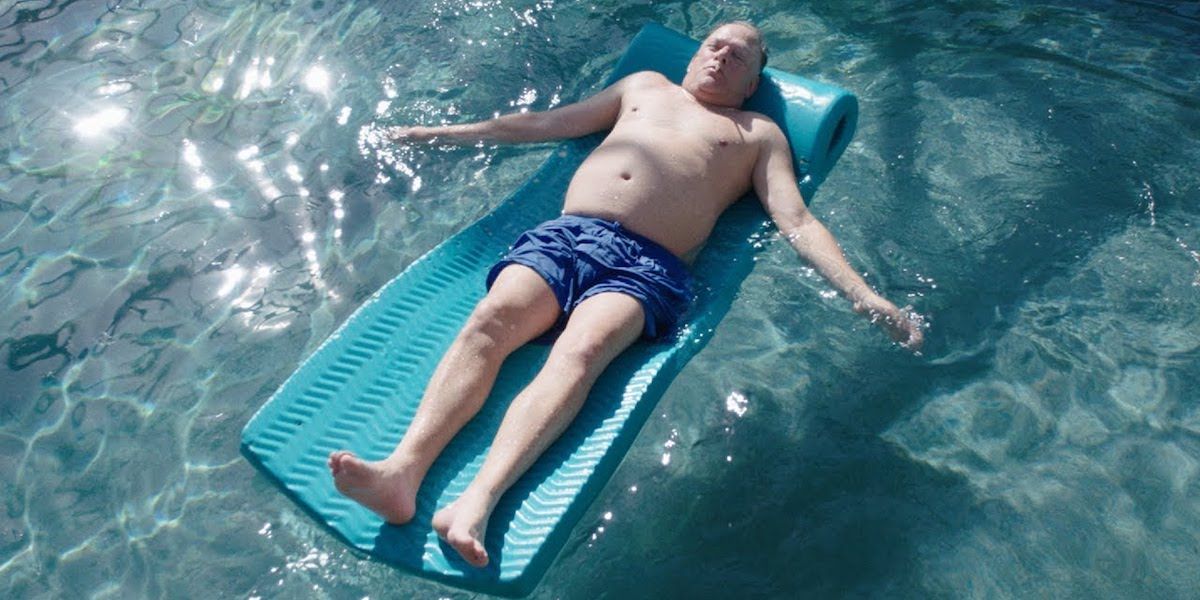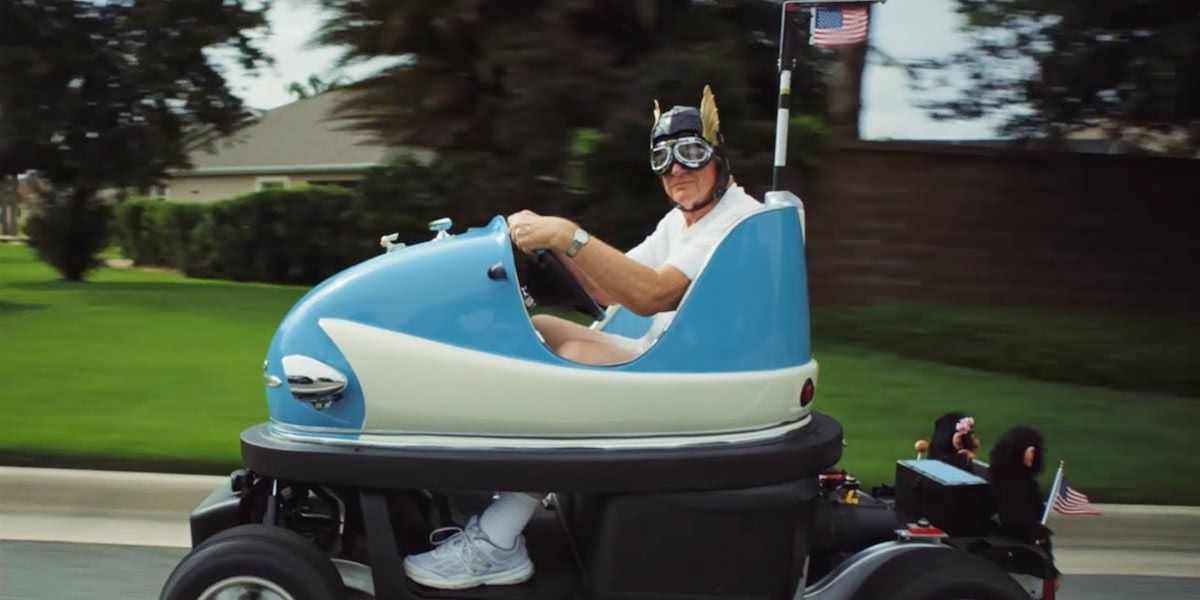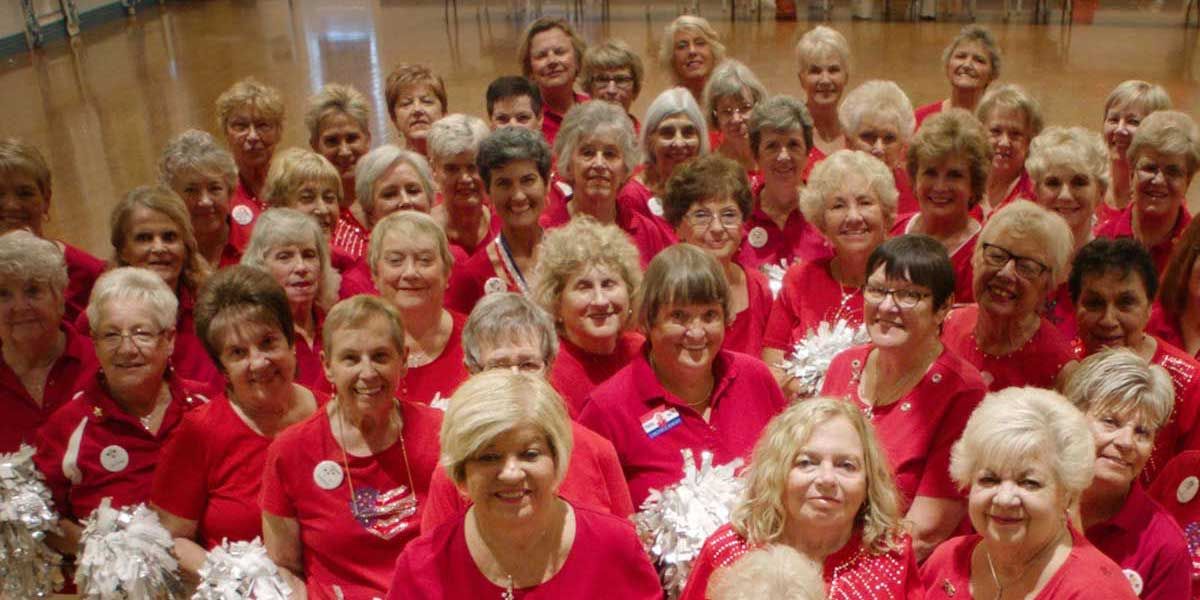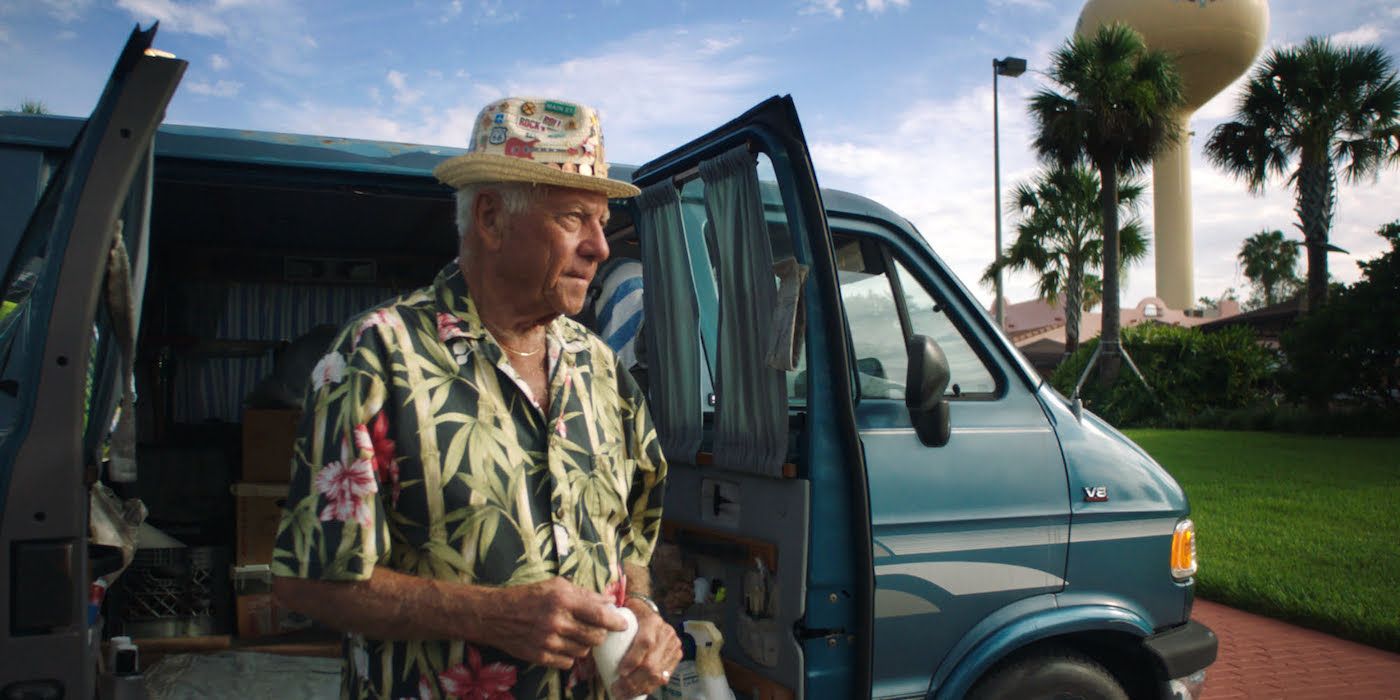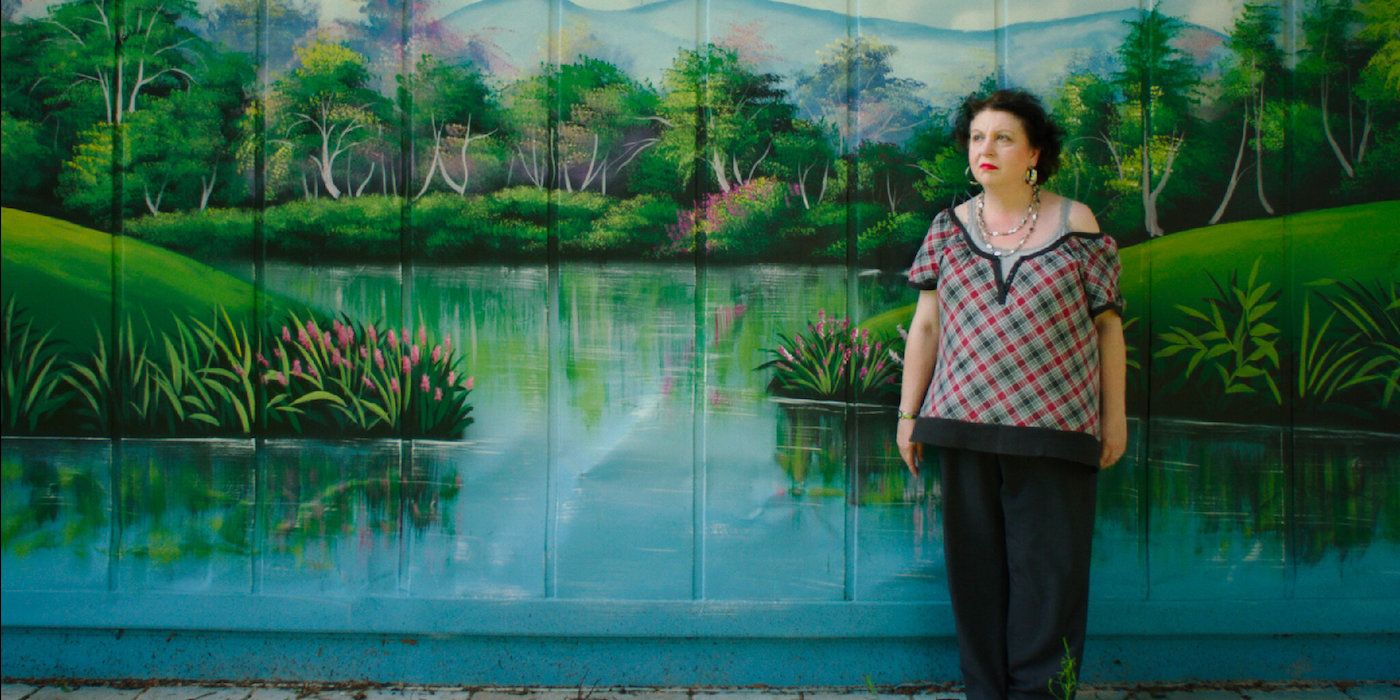Florida is seen as the retirement capital of the United States, and it's home to the world's largest retirement community, The Villages. More than 130,000 people live in the age-segregated haven for the 55+ set, a community designed to bring residents back to their idyllic youth. The fascinating truth behind The Villages is, despite the surreal aesthetic of their surroundings, the people who live there are no different from anyone else, just trying to get by and searching for the same things as their younger brethren. The stories of several of The Villages' residents are explored in Some Kind of Heaven, the debut full-length documentary feature from director Lance Oppenheim.
Some Kind of Heaven follows four people who haven't found what they are looking for. Barbara is a widow looking for a love connection; Dennis is an 80-year-old would-be ladies man looking for his next grift, and Anne and Reggie are a married couple who have to deal with Reggie's increasingly eccentric drug-addled behavior. Together, their stories form a snapshot of a corner of America that is often ignored or used as a cautionary punchline by younger generations. The film is noteworthy for its sincere, non-judgmental lens, examining the human souls of a generation that is rarely given the opportunity to speak for itself.
While promoting the home video release of Some Kind of Heaven, Lance Oppenheim spoke to Screen Rant about going into The Villages to craft his debut film. He talks about how he, a Florida native, grew up hearing stories about the "wacky residents" of The Villages, and how the film grew out of his previous short film, The Happiest Guy in the World. He discusses how the film grew from a short subject to a full-length documentary, and talks about how he managed to get one of his cinematic heroes, Darren Aronofsky, to come on board as a Producer.
Some Kind of Heaven is out now on Digital and DVD.
Hello, Lance!
Hey, how are you doing, man?
I'm doing good, but I'm shaken! I'm shaken by your movie! I'm actually an elder care worker, and it's something my mother did when she first moved to the United States. I go to the apartment of an 88-year-old lady and make her some food and we hang out and listen to records.
Wow! How long have you been doing that for? That sounds very beautiful.
Since about November or October or so. It's difficult, but such fulfilling work. She's such an insightful person, and I feel like I'm learning so much from her. But that's why it was difficult watching your movie. I got so stressed out by that man, Dennis. He was so open about trying to get a grift going.
Yeah, Dennis... Dennis...
Maybe I'm just a terribly judgmental person, but tt seems really difficult to make a movie from such a non-judgmental point-of-view, where you're just following these people and seeing what they're doing, and you're not going, "Hey Dennis, get out of here, get a job!"
It's funny, I feel like I got to know Dennis, I guess he's a grifter, a failed gigolo, whatever you want to call him... But honestly, I feel like the same approach that we had to bring to the subject portraiture of the movie was very similar to how we were looking at the place itself. The easiest thing you can do in a documentary is make someone look foolish. And I think the same would go for The Villages. If you thought to yourself, what would a documentary about The Villages be like? For me, at least, the first thing I wanted to avoid was that obvious way of looking at it, which would be a much more judgmental movie, which would be the "Okay, Boomer" documentary that really delights in and traffics in all the stereotypes and lampooning the people who live there. I was less interested in doing that, for one, because I thought it was less interesting and less fair. But also because I think there are really interesting people whose stories are not really told so often. And when they are told, I feel like they're sometimes pretty reductive. With someone like Dennis, I think you're completely right. It's very easy to look at someone who lives their life by his standards and judge them, but when you look past that, when you look just beyond the veneer, there is a great depth of regret, of longing, of desire. These are things that we all go through in our own ways. But to see someone who's trapped in this never-ending cycle of trying to be 20 years old, and now he's 84, it takes on a much different weight.
There's a deep sadness to him. You see it when he tries to call someone to get a few bucks together, and they hang up on him. It's like, at that point in anyone's life, is it possible to change? I mean, I'm 30 years old, but sometimes I feel like it's too late to go back from the path I've started down in my life. And when you're 80? At that point, how can you reinvent yourself? Is it even possible?
It's totally fascinating. And that dude, the pastor in the movie, Pastor Norman Lee Schaffer, when he tells Dennis, there's got to be more than just surviving. He tells him that, "You remind me of myself if I was 83, but I deliberately, when I was younger, chose to live my life differently so I wouldn't end up like you." All those things were so interesting to me. I think, when you go to The Villages, the most fascinating thing about it is that age becomes relative, and I think there's something very freeing about that, that you can be, essentially, whoever you want to be. Prat of the premise of the place like that is to return residents back to a time they are familiar with from their youth. There's so much baggage with what that actually means. I guess that's also one of the reasons I was interested in making the movie to begin with. How can you make a movie that isn't necessarily about older people, but is just about people who are just as complicated as you and I are? And I feel like the level of that portraiture, the level of that depiction... There are very few movies that have older characters in them, and the ones that do usually show them on inoffensive, naive adventures that deny them the complexity most people usually have when they get to that age. There were a lot of things like that I was really cognizant of in trying to make sure the movie had. I'm 25, and I think there was a lot of mutual curiosity that I had in my subjects, and that they also had in me, given that I was basically the age they were trying to return back to. I was trying to get all that spirit, all those observations I felt before we even started filming, just from spending time on the ground there. I was just trying to get that into the movie.
And you're a Florida native, right?
I am.
Did you have any relationship to this community beforehand? Did you see it through your periphery? In middle school, were you, like, "I'm going to make a movie about them one day!"
It's funny, I learned of The Villages while I was in middle school. Among many other Florida topics, it's sort of like Florida lore. There's a mythology around it, just because it's become the retirement Mecca, not just of Florida, but of the whole United States. Given that Florida is already known as "Retirement, USA," it takes a lot to do that! When I was growing up, it was really like... People would look at the place, the local newspaper where I was, about three or four hours away from The Villages, but no matter how far you got from The Villages, news and stories treated the residents and their hedonistic pursuits as punchlines. It would be all across the state. There would be shit all the time, like, "Elderly couple arrested for public sex." Stuff like that. I remember, as a middle schooler, I was definitely tantalized by that stuff. It was so beyond me, that someone my grandparents' age was having sex pretty frequently. But obviously, as I grew up... I don't know, I didn't find it all that interesting or all that surprising. I honestly wasn't really thinking about making a movie about that place. I definitely wasn't thinking it would become a feature. It was initially a short film. But I only really got the idea to make the film after finishing a previous film I made, which was about a guy living on a cruise ship for 20 years. He was in his late 60s, and the themes of that movie were really about... It was kind of a prelude to this film.
The Happiest Guy in the World.
Yes. He chose to leave behind all his friends, his family, his loved ones, and just basically embark on this isolationist fantasy where he could just live amidst wet t-shirt competitions for the rest of his life, because that's what happiness was for him. I was definitely interested in what I saw as a growing phenomenon of older people, who were baby boomers, choosing to isolate themselves in these age-segregated communities like The Villages. Right after I finished the film about the cruise man, I saw this article advertising The Villages as, not only the world's largest retirement community, but one of the fastest growing cities in America. When all of that stuff started happening, I was like, "Holy s***." There's definitely something happening here that says a lot about our country right now. And the fact that everyone... That 130,000 people are essentially picking up their lives and moving into this place that looked exactly like The Truman Show and was designed to simulate the 1950s or 1960s America, or, in some ways, an America that never really existed, just a bunch of ideological fantasies. That drew me instantly.
130,000? That's more than I realized!
The setting, wanting to make a film there that could also be an homage to what I grew up with; movies like Edward Scissorhands, or Defending Your Life, or Todd Haynes' Safe, or Bigger Than Life. All of those movies, in my mind, helped form a language about what suburban life is like, and how poisonous it can get. I saw that as an opportunity. The setting, The Villages, is a way to take those movies, make a melange of them, and then put it into this documentary.
I'm thinking about how... Maybe you get this a lot, maybe you got it a lot while you were there, but just about how young you are. You're younger than me, and I'm gonna have to deal with that myself later, but tell me, was there a resistance, a skepticism of, "Hey, are you coming in here to make fun of us?" How do you put this community at ease, a community that is designed to keep people your age, my age, and even people twice our age, out?
It's interesting. For one, I always had to check with myself... It's like you said, the community wasn't designed for people our age. It was designed for people of a specific generation. I was always trying to keep... There were many times... When I first got there, I discovered that I could Air BnB with folks that were there. So I ended up living with these rodeo clowns, and they showed me their entire life. They introduced me to their friends... This was about a month and a half before we started shooting. I was going around town with them. And I think, yes, I definitely stuck out like a sore thumb. I think most people were sort of, like, "What are you doing? Who are you, and why are you here?" But it came less from a stand-offish place, as it was more like there was a mutual curiosity that we inspired in each other. As they were undergoing their own Peter Pan syndrome, of trying to return to what life was like before they had kids or grandkids, I was also going through my own Peter Pan syndrome vibe, too. I was in complete denial of the fact I was about to graduate college and didn't really want to leave.
Leaving the nest is scary!
What ended up happening then was, there was this funny equalizing, there was this great equalizer effect. Especially with the subjects of the film. We all shared the same spirit, and it never felt like they were much older than me, or I was much younger than them. It always felt like we were equally undergoing and experiencing life together, and having to also undergo and experience really intense moments together. I think the last part of this, too, is, because I stuck out like a sore thumb, it informed the way we shot the film. No matter where you are, if you bring a camera into a public place, you immediately manipulate reality, and people start acting differently from how they normally would. I wanted to make the film feel like a cinematic experience, and I wanted to embrace the stilted nature of how I made people feel while I was there. For me, that meant shooting the movie completely on a tripod, and ditching the fly-on-the-wall aesthetic and leaning into something that felt more expressive, or heightened. Something that conjured up the experience of being in The Villages, and making sure that every frame of ours felt as composed and as meticulously crafted as the setting was, and how manicured the place was. A lot of this stuff, I felt, from that experience of just constantly feeling like an outsider, we tried to find a way to stylistically express that in the movie.
I don't know if the word is empathy... I think that's a word that is sometimes misused or can be reductive, but I'm thinking of my own experience taking care of my friend, who is 88, and watching TV with her, and sometimes there's a comedy show or whatever making fun of old people, and I'm like, "Hey, that's not cool!" Maybe that is empathy, but tell me about that kind of non-judgmental relationship and making sure you're protecting them while you're exploring their lives. You touched on how you related to them in a way you maybe didn't expect...
These four stories, these four subjects, they aren't representative of every person in The Villages. That was by design. I didn't want to make something that was more broadly about the place. The thing I was more interested in was exploring this existential condition, which is something I was also actively undergoing while I was there. As I spent a lot of time there, I started realizing that there are certainly a lot of people who are happy living there, but there's also a large amount of people, as well, who are privately going through really tough shit. When you're going through something really tough, and you're constantly surrounded by people who are having their best day ever, like they're living their best life, and there's a constant pressure that every second of every minute of every hour of every day of every week of every month needs to be spectacular because you have so little time left... I just, I don't know, that feeling that I feel each of the four subjects experiences in the movie, I related so deeply. It reminded me of every moment in my life where I was supposed to feel a certain way, but I didn't. And everyone was telling me how I should feel about something, or how I should be acting or reacting.
Even universal stuff like that needs to be experienced on an individual level.
And I think the other element of this, too, is that you move to a place to start your life over, and you think everything is going to be different, and it's always such a disappointment when it doesn't change. I think the four people in the movie are going through something that's fundamentally human, and watching them struggle, watching them go through the things they go through, in my mind, I don't know, it speaks to a few different ideas. The first idea is that, like, obviously we all grow older, but that doesn't mean you necessarily grow wiser. I think there's something kind of beautiful in that concept. I don't know if people fundamentally change over time. I think you can try, and try to grow, and I think that's exactly what's going on in this movie. We have four people who are more or less in the back-half of life. They have, maybe a chapter or two left in their lives. And they all are continuing to become. They're all searching and striving and looking for ways to better enact fantasies from their life before time runs out. To me, that's very beautiful. Sure, you can look at Dennis and say there's something depressing about someone who's living his life that way... He's 83 and just as much of a hot mess as most 22-year-olds are, but there's also something beautiful in that. There's something beautiful to the idea that there are certain questions you ask yourself, and there are certain ways you identify yourself. And still, you are constantly searching for something different, and that never really changes. You don't eventually reach this magic moment in life where all your problems fade away. That's just not how life works. To answer your question, I'd say I learned quite a bit. Now, I try not to look at someone by their age. I try to look at them by who they are, just as people.
Maybe I'm too hard on Dennis! I guess it's very easy... Gosh, I don't remember where I heard this, so I can't give credit to this quote, which is not my quote... But it applies here. "It's very easy to say, 'they're just like us.' It's a lot harder to say, 'we're just like them'"
Yeah, I love that!
You got The New York Times involved in this, and Darren Aronofsky, how did that come about?
It was a long journey, honestly. A lot of really crazy, exciting things happened along the way that were totally out of a dream, for me. I started this, it was my college thesis. I had gotten a little bit of financing from college, just to go make something, and I initially thought it was a short. I had worked with The New York Times several times before, on different short films, so I figured it would go to them. But as I kept working on it, I emerged from that first shoot thinking, "Okay, there's definitely something here. I don't have it yet, but I need to go back to figure out what that is." There was a lot of time where I was trying to figure out what it was, trying to convince people that I knew exactly what I was talking about, that I knew exactly what I was doing... Which was not true at all! But just to try to get the resources so I could go back and keep shooting. The New York Times were involved early in the sense that they were supporting the film as a short film. And then, very coincidentally, just as I was ramping up to go back again, they just had started their feature film division. It was great timing. There was a lot of convincing I had to do to get them to realize there was a feature film there, even though it wasn't obvious to anyone just yet.
And what about Darren?
As for Darren... Look, ever since I was in high school and the Sony hacks happened, I made a spreadsheet of a bunch of my favorite filmmakers who I idolized in there... And Darren is somebody who very much influenced me to start making movies. I remember seeing The Fountain, and The Wrestler in theaters, and kind of having an out-of-body experience. I had been sending Darren e-mails, not just saying, "Hey, can you produce my movie?" But I had been sending him e-mails saying, "Hey, I love your films. I'm in the same film program that you went to. I'm in this program because you went to it. I also study anthropology because you studied it... It was a little bit like Stan, the Eminem song, but hopefully less creepy... But long story short, he never replied to any of those e-mails. But finally, one of his executives, Brendan Naylor, saw one of them. This was probably, like, my tenth attempt to get in touch with him. And to my surprise, Brendan watched the rest of my work, he watched the films I was working on. He took a meeting with me. I showed him the material of what this film would become. Then, very quickly, it ended up getting to Darren, and Darren, also, I think, saw the potential, aesthetically, stylistically. Thematically, I think there were a lot of things that he was interested in doing, and different things he was interested in exploring at different parts of his career. And, being a good person, aside from being a great filmmaker, he also saw the opportunity to support a filmmaker and try and help me get the money that I needed to make the movie! That was really the collaboration there, and Darren and his team watched a lot of cuts of the film. Given that Darren was also not in production yet on his feature film which he's just finished up now, he was able to give us a lot of time and attention, which was really nice.
Excellent. The movie is great, I hope everyone watches it. It's a beautiful, haunting snapshot of a corner of Americana that a lot of us ignore or see as a sideshow.
Some Kind of Heaven is out now on Digital and DVD.

